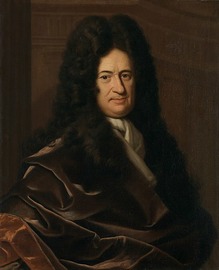en.wikipedia.org
- Was this helpful?
- Gottfried Wilhelm Leibniz (or Leibnitz; [a] 1 July 1646 [O.S. 21 June] - 14 November 1716) was a German polymath active as a mathematician, philosopher, scientist and diplomat who is credited, alongside Sir Isaac Newton, with the creation of calculus in addition to many other branches of mathematics, such as binary arithmetic and statistics.
britannica.com
7 days agoLearn about the life and achievements of Leibniz, a German philosopher, mathematician, and political adviser who invented the calculus and developed the principle of sufficient reason. Explore his metaphysics, logic, ethics, and theology, as well as his influence on modern rationalism and panpsychism.plato.stanford.edu
Stanford Encyclopedia of Philosophy
https://plato.stanford.edu › entries › leibniz
Gottfried Wilhelm Leibniz (1646-1716) was one of the great thinkers of the seventeenth and eighteenth centuries and is known as the last "universal genius". He made deep and important contributions to the fields of metaphysics, epistemology, logic, philosophy of religion, as well as mathematics, physics, geology, jurisprudence, and history.- Videos for gottfried wilhelm leibnizWas this helpful?
iep.utm.edu
Internet Encyclopedia of Philosophy
https://iep.utm.edu › leib-ove
A comprehensive overview of the life and works of the universal genius and early modern rationalist philosopher. Learn about his metaphysical idealism, his theory of possible worlds, his logic, his ethics, and his influence on Christian theology.worldhistory.org
World History Encyclopedia
https://www.worldhistory.org › Gottfried_Wilhelm_Leibniz
Jan 26, 2024Learn about the life and achievements of Leibniz, a German polymath who made contributions to science, mathematics, and philosophy. Discover his theory of monads, his calculus, his inventions, and his feud with Newton.mathshistory.st-andrews.ac.uk
MacTutor History of Mathematics Archive
https://mathshistory.st-andrews.ac.uk › Biographies › Leibniz
Learn about the life and achievements of Gottfried Leibniz, a German mathematician and philosopher who developed the calculus, invented a calculating machine, and tried to reunify Christianity. Explore his education, career, publications, and influences on mathematics and logic.iep.utm.edu
Internet Encyclopedia of Philosophy
https://iep.utm.edu › leib-met
Learn about the German rationalist philosopher Gottfried Wilhelm Leibniz (1646-1716) and his metaphysical system. Explore his theory of truth, his monadology, his pre-established harmony, and his solutions to philosophical problems.oxfordbibliographies.com
Learn about the life and work of Gottfried Wilhelm Leibniz, one of the greatest rationalist philosophers of the early modern period. Find introductions, critiques, and sources on his metaphysics, logic, ethics, and more.oxfordbibliographies.com
A comprehensive overview of Leibniz's life, work, and influence in various fields, from mathematics and philosophy to politics and theology. Find introductions, guides, and references to primary and secondary sources on Leibniz's universal genius and vision.philosophyalevel.com
Gottfried Wilhelm Leibniz. Born: July 1, 1646 (Leipzig, Holy Roman Empire) Died: November 14, 1716 (Hanover, Holy Roman Empire) Biography. Gottfried Wilhelm Leibniz was born in Leipzig in 1646. A precocious child, he began reading Latin by age seven and quickly taught himself Greek. By 15, he was studying philosophy and law at the University of ...Can’t find what you’re looking for?
Help us improve DuckDuckGo searches with your feedback
